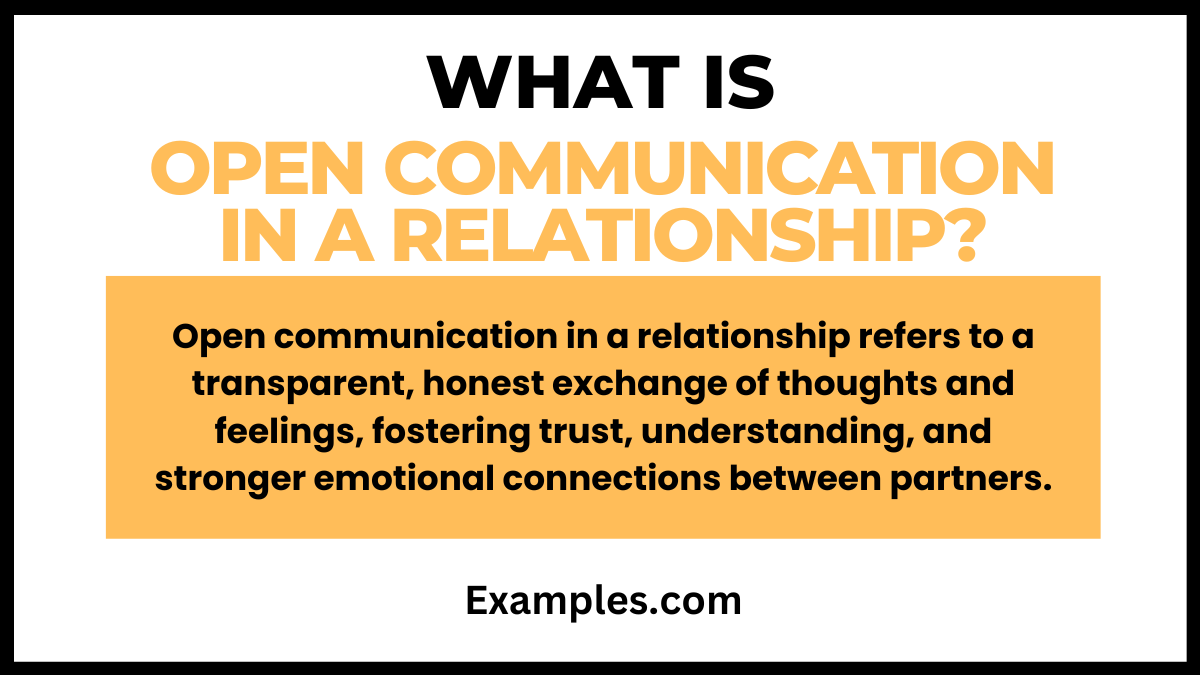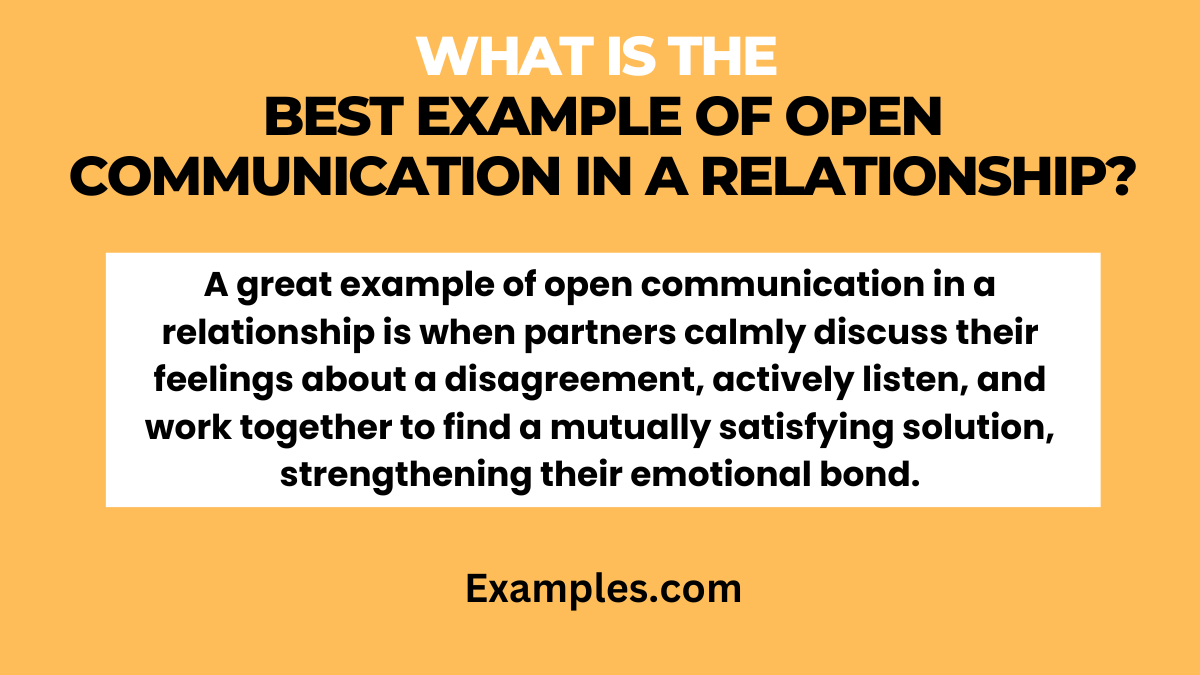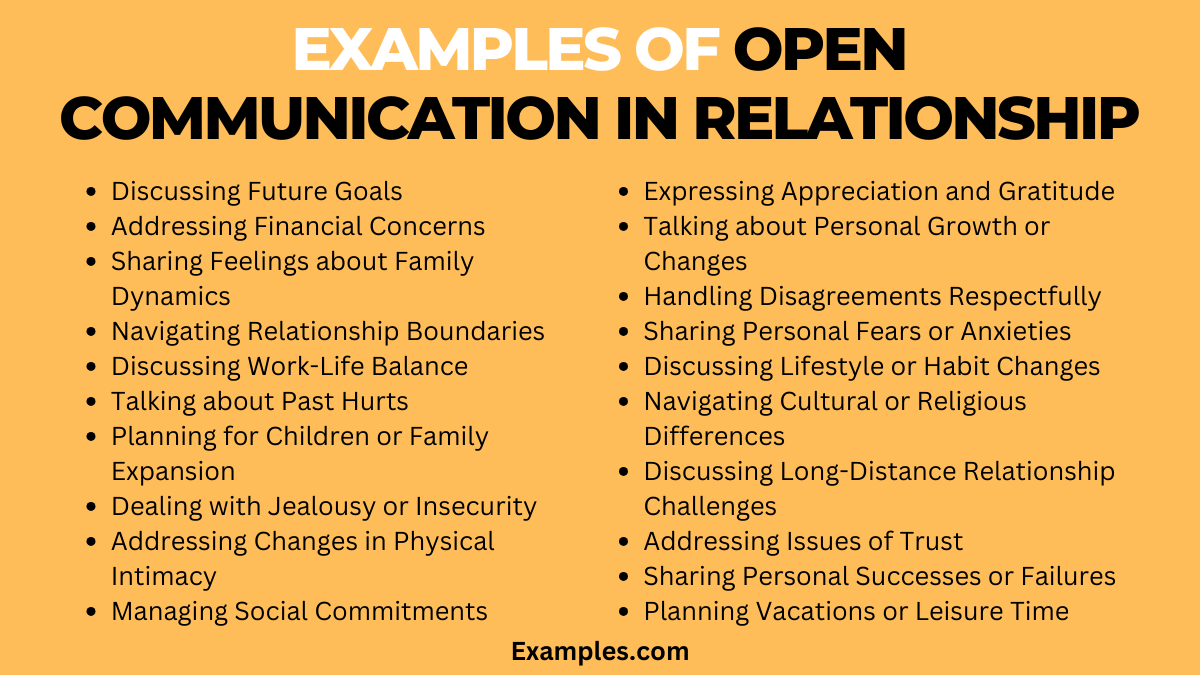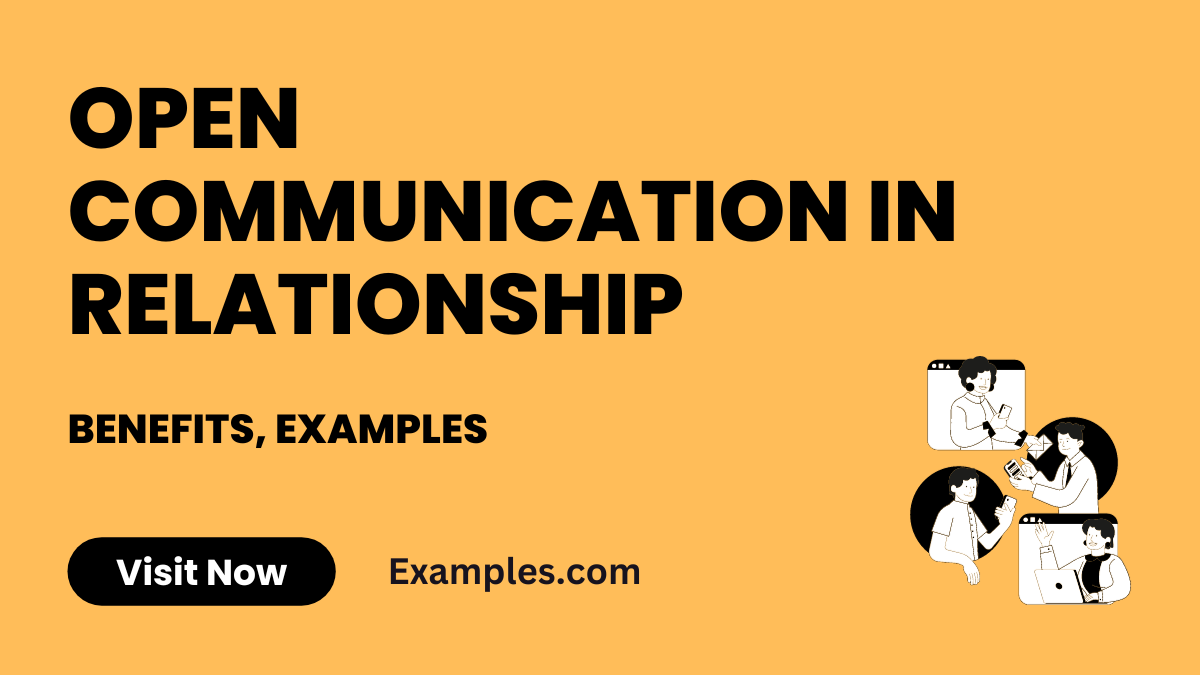19+ Open Communication in Relationship Examples
Open communication in relationships is a vital ingredient for lasting harmony and understanding. This comprehensive guide delves into practical communication examples, showcasing how honest and clear exchanges can strengthen romantic bonds. We’ll explore various scenarios where effective communication transforms relationship dynamics, offering insights and strategies for every couple. Whether facing challenges or nurturing connection, these examples will illuminate the path to a more fulfilling partnership. Stay tuned for enlightening tips and techniques in open communication.
Download Open Communication in Relationship in PDFWhat is Open Communication in a Relationship? – Meaning

Open communication in a relationship refers to the honest and transparent exchange of thoughts, feelings, and information between partners. It’s a form of healthy communication in relationships that involves expressing oneself clearly and listening actively to the other person. This communication style fosters trust and understanding, helping to prevent miscommunication in relationships. Open communication is not just about talking; it’s also about creating a safe space where both partners feel heard and respected.
What is the Best Example of Open Communication in a Relationship?

The best example of open communication in a relationship is when partners engage in a calm, respectful dialogue about a sensitive topic. For instance, discussing future plans or addressing a misunderstanding. In this scenario, both individuals feel safe to express their true thoughts and feelings without fear of judgment or retaliation. They listen attentively, validate each other’s perspectives, and work together to find a solution or reach a mutual understanding. This type of communication builds trust, deepens emotional connection, and strengthens the bond, exemplifying healthy communication in relationships.
20 Examples of Open Communication in Relationship

Open communication in relationships is essential for building trust and deepening connections. This guide provides 20 unique examples, each illustrating effective communication strategies. These examples will help couples understand how to navigate conversations with honesty, empathy, and understanding. From resolving conflicts to sharing dreams, these scenarios demonstrate the importance of healthy communication in maintaining a strong, loving relationship.
- Discussing Future Goals: When talking about future plans, partners can say, “I value your dreams and would love to hear more about your goals. Let’s find ways to support each other in achieving them.”
- Addressing Financial Concerns: In financial discussions, it’s helpful to say, “I think we should look at our budget together. Your thoughts are important to me, and I want us to make decisions that benefit both of us.”
- Sharing Feelings about Family Dynamics: A partner might express, “I feel a bit overwhelmed by our family commitments. Can we talk about finding a balance that works for both of us?”
- Navigating Relationship Boundaries: A conversation starter could be, “I respect your space and time. Let’s discuss our boundaries to ensure we both feel comfortable and respected.”
- Discussing Work-Life Balance: One might initiate, “Our careers are important, but so is our relationship. How can we better balance these aspects of our lives?”
- Talking about Past Hurts: A sensitive approach is, “I want to understand and support you. Can you share with me how you felt about what happened?”
- Planning for Children or Family Expansion: Partners could discuss, “Let’s share our thoughts about starting a family. It’s important that we’re both on the same page with this decision.”
- Dealing with Jealousy or Insecurity: Openly expressing, “I sometimes feel insecure. Can we talk about it so I can understand my feelings better?”
- Addressing Changes in Physical Intimacy: A gentle conversation might be, “I’ve noticed some changes in our intimacy. Can we talk about what we both need and desire?”
- Managing Social Commitments: A partner could suggest, “Let’s find a balance in our social life that makes us both happy. Your comfort is important to me.”
- Expressing Appreciation and Gratitude: Regularly saying, “I really appreciate what you did. It means a lot to me,” fosters positivity.
- Talking about Personal Growth or Changes: One might express, “I’m going through some changes. Let’s talk about how we can grow together during this time.”
- Handling Disagreements Respectfully: During a disagreement, saying, “I understand your point of view. Let’s find a solution that works for both of us,” is key.
- Sharing Personal Fears or Anxieties: Openly discussing, “I have some fears that I’d like to share with you. Your support means a lot to me.”
- Discussing Lifestyle or Habit Changes: A constructive approach is, “I’m thinking of making some lifestyle changes. What are your thoughts on this?”
- Navigating Cultural or Religious Differences: A respectful dialogue could be, “Our backgrounds are different. Let’s talk about how we can honor and embrace these differences together.”
- Discussing Long-Distance Relationship Challenges: Saying, “Long distance is challenging. How can we strengthen our communication to feel more connected?”
- Addressing Issues of Trust: A conversation might start with, “Trust is fundamental for us. Let’s talk about how we can build and maintain trust.”
- Sharing Personal Successes or Failures: A supportive statement could be, “I want to share my successes and failures with you. Your input is valuable to me.”
- Planning Vacations or Leisure Time: One might say, “I’d love to plan our next vacation together. What are some places you’d like to visit?”
Each of these examples represents a building block for a robust, open, and loving relationship, emphasizing the crucial role of effective communication and understanding in partnerships.
Why Open Communication is Important in Any Relationship
Open communication is the cornerstone of a healthy and thriving relationship. It involves expressing thoughts, feelings, and needs transparently and respectfully, fostering a deeper understanding between partners. This level of honesty helps prevent misunderstandings and builds a strong foundation of trust. Open communication also encourages emotional intimacy, allowing partners to feel more connected and supported. In relationships where open communication is practiced, issues are resolved more effectively, leading to greater relationship satisfaction and resilience. This is particularly important in maintaining healthy communication in relationships, where both partners feel valued and heard.
Good vs. Poor Communication in a Relationship
The contrast between good and poor communication can significantly impact the health of a relationship. Good communication is characterized by active listening, empathy, honesty, and respect. It allows partners to express themselves without fear of judgment, leading to a stronger, more understanding bond. On the other hand, poor communication often involves assumptions, neglect of the partner’s feelings, and a lack of effective listening. This can lead to misunderstandings, miscommunication in relationships, and unresolved conflicts, which can erode trust and intimacy over time. Good communication is a skill that can be developed and refined, transforming the quality of a relationship and enhancing the connection between partners. Emphasizing open communication in relationships not only resolves conflicts but also enriches the emotional depth and satisfaction in the partnership.
| Good Communication | Poor Communication |
|---|---|
| Active Listening | Listening passively or not at all, leading to misunderstandings. |
| Empathy | Lack of empathy, failing to understand or respect the partner’s feelings. |
| Honesty | Dishonesty or withholding information, which erodes trust. |
| Respect | Disrespectful or dismissive attitudes, causing emotional distance. |
| Openness | Closed off or defensive, preventing genuine dialogue. |
| Constructive Feedback | Criticism that is harsh or belittling, damaging self-esteem. |
| Problem-Solving Approach | Avoiding problems or blaming, leading to unresolved issues. |
| Supportiveness | Lack of support or understanding, making the partner feel alone. |
| Consistency | Inconsistent messages, creating confusion and insecurity. |
| Patience | Impatience or intolerance, leading to frustration and anger. |
Benefits of Open Communication in Relationship
Open communication in a relationship brings numerous benefits that contribute to a healthier and more fulfilling partnership. Firstly, it enhances mutual understanding, as partners openly share their thoughts and feelings. This level of transparency builds trust, a crucial element in any strong relationship. Open communication also aids in resolving conflicts more effectively, as both parties feel heard and respected. It fosters emotional intimacy, allowing partners to connect on a deeper level and feel more secure in their relationship. Furthermore, it promotes personal growth, as individuals learn to express themselves clearly and listen actively. By prioritizing open communication, relationships can flourish, characterized by a strong bond of mutual respect and understanding.
How to Have Open Communication in a Relationship
Having open communication in a relationship involves several key steps:
- Practice Active Listening: Show genuine interest in what your partner is saying. Avoid interrupting and ensure you understand their perspective.
- Speak Honestly and Respectfully: Be truthful in your communication, but also consider your partner’s feelings. Use “I” statements to express your thoughts and feelings without blaming.
- Validate Each Other’s Feelings: Acknowledge and respect your partner’s emotions. This validation is crucial for fostering a safe environment for open dialogue.
- Set Aside Time for Communication: Dedicate specific times to talk without distractions. Regular check-ins can help maintain a strong connection.
- Develop Empathy: Try to understand your partner’s viewpoint, even if it differs from yours. Empathy is key to healthy communication in relationships.
- Manage Conflict Constructively: When disagreements arise, focus on finding solutions together rather than winning an argument.
- Be Patient and Open-Minded: Understand that effective communication takes time and effort. Be willing to adapt and grow together.
- Seek Understanding, Not Just Agreement: Aim to understand your partner’s point of view, even if you don’t agree with it. This approach can deepen your connection.
By incorporating these practices into your relationship, you can achieve a level of open communication that enhances the quality of your partnership. Remember, open communication is a skill that can be developed over time, contributing significantly to the strength and health of your relationship.
Is Open Communication Good in a Relationship?
Yes, open communication is essential in relationships. It fosters trust, deepens emotional connection, and aids in resolving conflicts effectively.
How Do You Openly Communicate in a Relationship?
Openly communicate by actively listening, sharing feelings honestly, validating each other, and addressing issues respectfully and empathetically.
Why is Communication Important in a Relationship?
Communication is vital in relationships for understanding, trust-building, conflict resolution, and strengthening emotional bonds between partners.
Why Do I Struggle to Communicate in a Relationship?
Struggling to communicate in a relationship can stem from fear of vulnerability, past experiences, or lack of effective communication skills.
The Pew Research Center has conducted extensive research on views and experiences in relationships in the United States. Their findings highlight the significance of communication in maintaining healthy relationships and navigating the complexities of modern dating and partnerships. For more insights, visit their website: Pew Research Center??.
A comprehensive guide by AtOnce provides startling statistics on conflict in relationships. The guide reveals that 40% of couples argue about the same issues repeatedly, 56% say conflict has negatively impacted their mental health, and 72% believe unresolved conflicts can end relationships. Importantly, 80% of couples who felt satisfied with their communication were still together after five years, underscoring the critical role of effective communication in relationship longevity. For detailed statistics, visit AtOnce’s Guide on Conflict in Relationships??.
Open communication is a pivotal element in nurturing and sustaining healthy relationships. It builds trust, understanding, and a strong emotional bond between partners. By practicing honest, empathetic, and respectful dialogue, couples can overcome challenges and grow together. Embracing open communication paves the way for deeper connections and a more fulfilling partnership.



